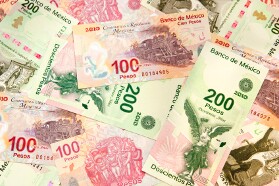The Mexican peso is rising against several currencies at the end of the trading week. The pesoâs recent rally comes as President Donald Trump threatened to close the border, a move that many have estimated would cost both countries billions of dollars in lost commerce. On the domestic front, the federal government plans to curb spending amid slower economic growth and falling crude oil production, leaving financial analysts with the impression that the country is becoming more fiscally sound.
Last week, President Trump said he would shut down the US southern border and end all connections with Mexico, including trade, until the country stopped all illegal immigration. But after several warnings from business leaders, analysts, and border city officials, the president backtracked and changed the nature of his threat.
Speaking to reporters on Thursday, Trump instead gave Mexico a âone-year warningâ and conceded he would try âless drastic measuresâ before returning to the idea of closing the border.
Weâre going to give them a one-year warning, and if the drugs donât stop or largely stop, weâre going to put tariffs on Mexico and products, particularly cars. And if that doesnât stop the drugs, we close the border.
Mexico understands that weâre going to close the border or Iâm going to tariff the cars. Iâll do one or the other. And probably start off with the tariffs. I donât think weâll ever have to close the border because the penalty of tariffs on cars coming into the United States from Mexico, at 25%, will be massive.
This comes only months after the US completed a lengthy trade discussion with Mexico and Canada to form the USMCA.
Mexican officials were not in a state of panic. Foreign relations secretary, Marcelo Ebrard, said the government had not changed its immigration policies. Martha Barcena, Mexicoâs US Ambassador, revealed that the government is working hard to make its border âmore orderly.â Jesus Seade, the Mexican undersecretary for North America, dismissed the threat of new tariffs, explaining that these trade levies were not a part of the USCMA.
Investors are confident that Mexico is turning over a new fiscal leaf.
With economic growth slowing down and oil output levels falling, the government has pledged to cut spending. The Finance Ministry said it would slash $6.2 billion from its $296 billion budget, representing 2.5% of annual gross domestic product (GDP).
Meanwhile, the Mexican central bank is expected to pursue policy tightening later this year, though it is almost certain that it will keep interest rates on hold for the next several months.
Because of these developments, some analysts anticipate that the peso will make significant gains against its American counterpart in the coming years, particularly when the Wall Street consensus is that the regionâs second-largest economy is projected to grow.
The USD/MXN currency pair tumbled 0.27% to 19.096, from an opening of 19.148, at 14:11 GMT on Friday. The EUR/MXN slipped 0.25% to 21.4341, from an opening of 21.4851.
If you have any questions, comments, or opinions regarding the Mexican Peso, feel free to post them using the commentary form below.
